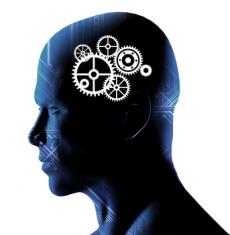Minding Your Mind: Using your Thoughts to Gain Better Emotional Well-being
 Before you begin reading this, do two things. Take a couple of deep breaths and fully exhale. Next, stretch your entire body. Then tighten your body and let it go a limp. I recommend that you do this quick exercise every day for the next week.
Before you begin reading this, do two things. Take a couple of deep breaths and fully exhale. Next, stretch your entire body. Then tighten your body and let it go a limp. I recommend that you do this quick exercise every day for the next week.
We are living in an uncertain and stressful time. Many of us unconsciously hold our breath, clench our jaws and tighten our bodies when stressed. We feel as though we are waiting for something awful to happen or for the next “shoe to drop.” Living on high alert for long periods leaves us physically exhausted, emotionally worn out and susceptible to developing a negative mindset. The good news is that there are many ways to calm our bodies and our minds. We can train ourselves to live with more peace by minding our minds and tailoring our thoughts so we are not expecting the worse. I have coined a concept of learning to “live in the grey.” Living in the grey is learning to live in a place that is somewhere between the concrete tangible plane and the anxious mind.
As a therapist, I have come to recognize that many people who struggle with emotional/mental health challenges often look at things in a very black-and-white manner. Seeing things as “this-or-that” or “black-or-white” can actually increase our sense of stress and anxiety. When we allow ourselves to embrace uncertainty and live in the grey area, we invite a relaxed mind and body. How do you do this? There are three main areas where most people can let go of the concrete and start living in the grey.
- Minding Your Thoughts. Every action, decision and spoken word originates with a thought. The idea of minding our thoughts can quite literally be life changing. We often underestimate the control we have over the thoughts that come into our minds. It is critical to our emotional well-being that we do not allow our thoughts to have free reign in our mind. The first step in managing our thoughts is to break them down and differentiate them. Are the thoughts based in reality or based in distortion of reality? This examination is important because our thought patterns often translate into our actions and influence the decisions we make. When you take the time to evaluate your thoughts, you can better control their influence on your mind and body. When you are struggling with thoughts, write them down. When thoughts are examined in a written format, it is easier to determine if it is based in reality or a distortion of reality. If you find it hard to be objective about your own thoughts, consider talking with someone you trust to help you assess the rationale behind the thought. If the thought is a result of a distorted view, another person can be helpful in pointing it out and help you to replace the concerning thought with one that is based more on the facts of the situation.
- Having Perspective. Perspective is one of the best gifts we can give ourselves–the gift to be open to the possibility that our first assessment/perception of a situation may not be based in reality. This concept can be applied to painful and negative experiences in our lives. It is a tool that allows us to experience the inevitable tough parts of life and not be overcome by them. A perspective that I have embraced personally is trying to find “purpose in pain.” This perspective allows me to live in and through the hard realities of life without being defined by them.
- Wellness is an Intentional Practice. If there were a magic pill, we would all feel amazing all of the time. Unfortunately, wellness is something we need to practice on a daily basis. A healthy body leads to a healthy mind. It is through the daily practice of maintaining good physical health and making a conscious effort to maintain a positive mindset that we obtain optimal benefit. It is as simple as practice, practice, practice.
There is an old saying that "tough times never last but tough people do." While sometimes we experience tough times that feel like they will last forever, they really do pass. Embrace the uncertainty and teach yourself to live in the grey.
Jason Manning-Beekman, LCPC, is a licensed clinical professional counselor providing therapy for patients in Brook Lane’s hospital. He has over two years of experience in providing acute mental health therapy for children and adolescents at Brook Lane. Jason is currently completing his course requirements for a doctorate degree in education at his alma mater, Liberty University in Lynchburg, Virginia.
